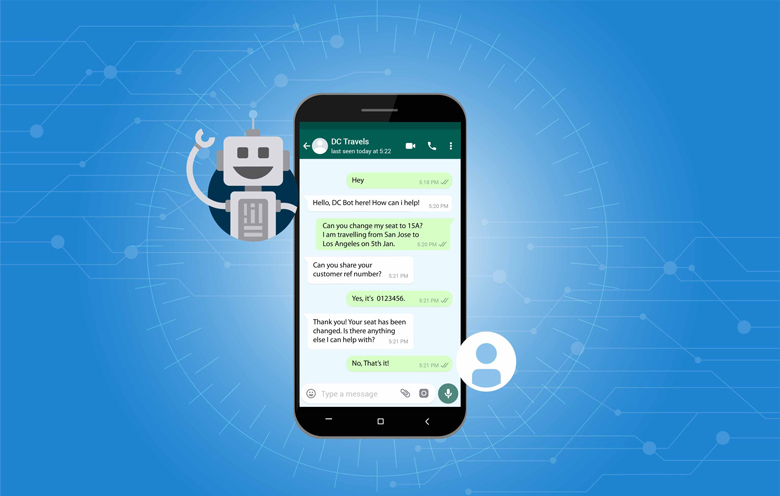Customer service is integral to modern business success as it directly impacts customer satisfaction, brand reputation, and revenue generation. By prioritizing exceptional customer service, businesses can foster relationships with their customers and drive growth in today’s dynamic marketplace.
By integrating and delivering great customer experience service strategies, businesses can enhance efficiency and scalability and give remarkable experiences to their customers.
Let’s take a look at the definition, the benefits, and some examples of businesses using WhatsApp chatbot!
Why WhatsApp for customer service?
WhatsApp chatbot is one of the most widely used messaging platforms globally, with billions of active users. It’s a preferred communication channel for many people, making it convenient for businesses to communicate with customers where they are already present.
WhatsApp enables businesses to communicate with customers in real time, facilitating instant support and feedback. Messages are delivered directly to customers’ smartphones, ensuring prompt responses and enhancing the overall customer experience.
WhatsApp supports various multimedia formats, allowing businesses to share images, videos, and documents with customers. This capability is beneficial for providing visual product demonstrations, sharing promotional content, and resolving issues more effectively.
WhatsApp offers APIs and tools for businesses to integrate chatbots seamlessly into their customer service operations. This enables businesses to automate responses, handle inquiries at scale, and provide round-the-clock support through WhatsApp.
The Rise of WhatsApp Chatbot for Customer Service
Customer service is a cornerstone of modern business success. Providing exceptional customer service ensures customers have positive experiences when interacting with a business. Satisfied customers are more likely to return for future purchases and recommend the business to others, contributing to long-term success.
By integrating chatbots as a customer service strategy, businesses can enhance efficiency, scalability, and personalization to finally deliver outstanding experiences for customers.
Delve Deeper on WhatsApp Chatbot
A WhatsApp chatbot is an automated software program designed to interact with users via the WhatsApp messaging platform. It utilizes artificial intelligence (AI) and predefined algorithms to understand and respond to user queries, provide information, perform tasks, and facilitate conversations.
WhatsApp chatbots are programmed to simulate human-like interactions, enabling businesses to offer personalized customer support, deliver relevant content, automate routine tasks, and streamline communication processes through the popular messaging app.
Evolution of chatbot in customer service
The evolution of chatbots in customer service has been significant, marked by technological advancements and changing consumer preferences:
- Early stage. Initially, chatbots were basic and rule-based, capable of responding only to specific keywords or commands. They were primarily used for simple tasks such as providing defined answers to frequently asked questions.
- Advancements in AI. With advancements in AI technologies, chatbots have become more sophisticated. They gained the ability to understand and interpret natural language, allowing for more conversational interactions with users.
- Integration with the messaging platforms. Chatbots have evolved to be integrated with popular messaging platforms like Facebook Messenger, Slack, and WhatsApp. This integration has enabled businesses to reach customers where they already spend a significant amount of time and communicate with them in a familiar environment.
- Personalization. Modern chatbots leverage machine learning algorithms to analyze user data and provide personalized responses.
- Multichannel support. Chatbots expanded beyond text-based interactions to support multimedia content such as images, videos, and documents.
- Integration with CRM systems. With WhatsApp integration, advanced chatbots seamlessly integrate with customer relationship management (CRM) systems. They can access customer data, initiate transactions, and automate routine tasks, streamlining workflows and enhancing operational efficiency.
Benefits of Using WhatsApp Chatbots
- Improved customer engagement: WhatsApp chatbots enable businesses to engage with customers in real-time, providing instant responses to inquiries and support requests. This immediate interaction enhances customer engagement and satisfaction.
- 24/7 availability: WhatsApp chatbots can operate around the clock, providing support to customers at any time of the day or night. This ensures that customers can receive assistance whenever needed, even outside of regular business hours.
- Cost-efficiency: Automating customer service tasks with chatbots can significantly reduce operational costs for businesses. Chatbots can handle a large volume of inquiries simultaneously without requiring additional human resources, making them a cost-effective solution for customer support.
Use Cases of WhatsApp Chatbots for Businesses
In business, whatsapp chatbots can be used for some cases and business operations. Here they are:
- Order Placement and Tracking
Customers can use WhatsApp chatbots to place orders for products or services directly within the messaging app. Chatbots can also provide order confirmation, shipping details, and real-time tracking updates, allowing customers to monitor the status of their orders conveniently.
- Customer Support and Issue Resolution
WhatsApp chatbots can efficiently handle customer inquiries, complaints, and support requests. They can provide instant responses to frequently asked questions, troubleshoot common issues, and escalate complex inquiries to human agents when necessary. This enables businesses to provide timely assistance to customers and resolve issues effectively.
- Appointment Scheduling
Businesses in industries such as healthcare, beauty, and consulting can use WhatsApp chatbots to facilitate appointment scheduling. Customers can book appointments, reschedule or cancel bookings, and receive appointment reminders and confirmations via WhatsApp, streamlining the scheduling process and reducing no-shows.
- Feedback Collection and Surveys
WhatsApp chatbots can automate the process of collecting customer feedback and conducting surveys. Businesses can use chatbots to gather feedback on products, services, or customer experiences, as well as to gauge customer satisfaction levels and identify areas for improvement. This valuable feedback can inform business decisions and drive continuous improvement efforts.
- Product Recommendations and Upselling
Chatbots on WhatsApp can analyze customer preferences and past purchases to provide personalized product recommendations and promotions. Businesses can use chatbots to upsell or cross-sell relevant products or services, increasing sales opportunities and revenue generation.
Example of Businesses Using WhatsApp Chatbot for Customer Service
Here are some examples of businesses that have implemented WhatsApp chatbots for customer service:
- Uber
Uber utilizes WhatsApp chatbots to communicate with drivers and riders in certain regions. Customers can use WhatsApp to book rides, get updates on their trips, and contact support if needed.
- Coca-Cola
Coca-Cola in Pakistan launched a WhatsApp chatbot to engage with customers, answer their queries, and provide information about promotions and events.
- OYO
OYO, a hospitality company, employs WhatsApp chatbots to facilitate hotel bookings, manage reservations, and address customer queries and concerns.
Conclusion
Businesses today have recognized the importance of providing exceptional customer service to foster relationships with their customers and drive growth. With the rise of WhatsApp chatbots, businesses can enhance efficiency, scalability, and personalization to deliver outstanding experiences for customers. WhatsApp’s popularity and accessibility make it an ideal platform for businesses to communicate with customers in real-time and automate operation systems.
As chatbots continue to evolve with advancements in AI and integration with various platforms, businesses can leverage this technology to enhance their customer service strategies and gain a competitive edge in today’s dynamic marketplace.





